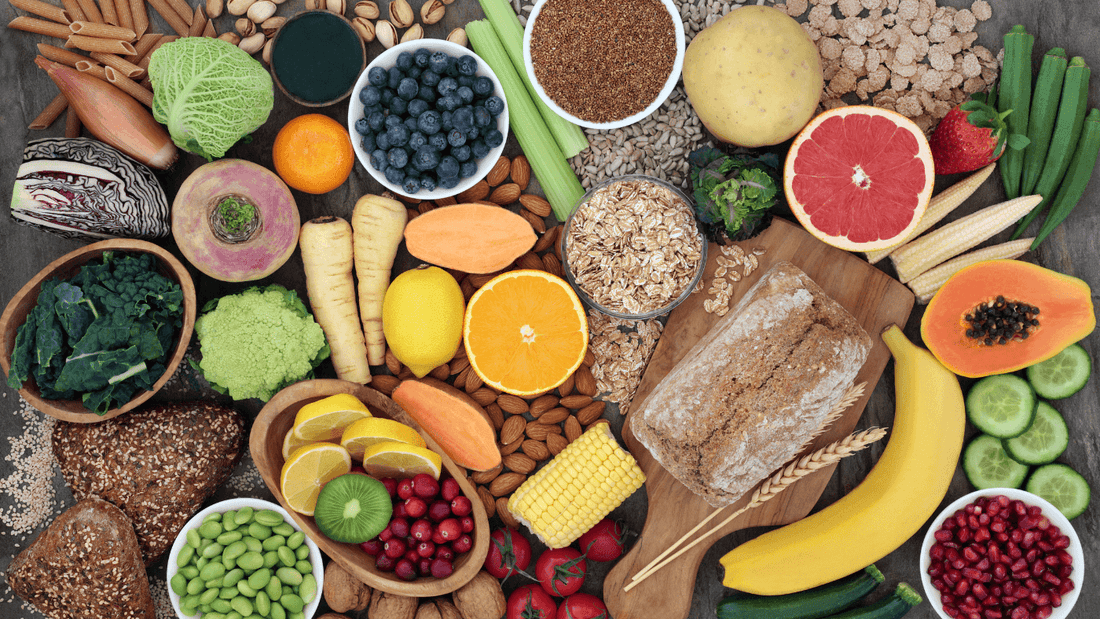Fibre goes far beyond digestive health, it is a life-saving superfood!
In this blog we will look at:
- Why fibre is so important
- What is prebiotic fibre
- How to boost your fibre intake
- High fibre foods
- How I increase fibre in my diet
- Where to get your fibre fix
Why is fibre so important?
According to the National Diet and Nutrition Survey 91% of people in the UK aren't getting enough fibre in their diets! (1) We should aim to eat 30 g of fibre daily; however, the average intake is just 19 g daily.
An analysis of 185 studies and 58 clinical trials published in The Lancet medical journal suggested that if 1,000 people shifted from a low-fibre diet to a high-fibre diet, it would prevent 13 deaths and six cases of heart disease.
Additionally, the analysis showed lower levels of type-2 diabetes, lower weight, blood pressure, cholesterol levels, and bowel cancer.
Dietary fibre can offer the following benefits when you consume it:
- Reducing cholesterol. Fibres in the digestive tract can help reduce the body’s cholesterol absorption.
- Adding bulk to the digestive tract. Those who struggle with constipation or a generally sluggish digestive tract may wish to add fibre to their diet. Fibre naturally adds bulk to the digestive tract, as your body doesn’t digest it. This stimulates the intestines and helps reduce constipation.
- Promoting a healthy weight. Fibre can slow digestion in the stomach to help you feel fuller for longer. However, only a specific type of fibre can assist with weight management - soluble fibre.(2)
- Promoting blood sugar control. It can take your body longer to break down high fibre foods. This helps you maintain more consistent blood sugar levels, which is especially helpful for those with diabetes. Chicory root fibre (which is a special prebiotic fibre and what's in ió fibrewater) achieved an EU and UK health claim for lowering and slowing blood glucose rise.(3)
- Reducing gastrointestinal cancer risk. Eating enough fibre can have protective effects against certain cancer types, including colon cancer. There are many reasons for this, including that some types of fibre, such as the pectin in apples, may have antioxidant-like properties (4).
- Promoting cardiovascular health. Studies have shown that dietary fibre intake is associated with decreased risk of cardiovascular disease. (5)
Ps. Constipation is a lot more common than you might think! According to the NHS, 1 in 3 children and 1 in 7 adults struggle with constipation at any time(6).
Find out more:
5 Signs of Constipation (& Natural Constipation Relief Solutions)

What is prebiotic fibre?
Prebiotic fibre is an essential and special type of dietary fibre that promotes the growth of beneficial bacteria in the gut, also known as gut flora.
Unlike probiotics, which are live microorganisms that provide health benefits when consumed, prebiotic fibres are not living organisms, but rather indigestible carbohydrates that serve as food for the bacteria that live in our intestines.
Probiotics on their own have a limited effect because they’re easily destroyed. For probiotics to flourish, they need the right food to feed on – and that’s where prebiotics come into play.

The best source of prebiotic fibre comes from chicory root. Approximately 68% prebiotic fibre (inulin) comes from chicory root.
Prebiotics take the proven benefits of dietary fibre to the next level.
Read more: What is prebiotic fibre?
How to increase your fibre intake easily and enjoyably
‘Eating the rainbow’ of fresh vegetables and fruits, in addition to eating whole foods such as brown rice, oatmeal, beans and pulses is a great place to start.

Eating around 30 different fruits and vegetables weekly encourages a healthier gut microbiome. And of course, ensuring that you eat prebiotic fibre elevates health benefits even more!
High fibre food examples
Foods high in fibre include berries, oats, cruciferous vegetables - and even dark chocolate!
Remember that you should be aiming to achieve at least 30g of fibre daily to achieve health benefits.
Here are just a few high fibre foods:
- Avocado - 6.7g (100 g)
- Raspberries - 6.5g (one cup)
- Apples - 4.4g (one medium-sized raw apple)
- Bananas - 3.1g (one medium sized banana)
- Oatmeal - 5g (1 cup instant, cooked)
- Fava beans - 9g (170g, cooked)
- Green peas - 9g (1 cup, cooked)
For a much more comprehensive list of foods high in fibre, check out this Mayo Clinic link here.
Example day of how I increase my fibre and prebiotic fibre in my diet:
Morning
I start my day by eating The Great British Porridge Co Instant Porridge. (The chocolate flavour is lush and tastes like dessert for brekkie. What could be better than that?!). This gives me 4.6g of fibre.
I sip on a bottle of ió fibrewater through my morning (another 6g of fibre (4.5g of which is prebiotic). This gives me 10.6g of fibre. And if I top my porridge with banana slices, that's another 1.4g of fibre (and super yummy!).
Lunch:
I like to make a (very) large pot of soup in my (7 litre!) slow cooker on the weekends. This lasts the whole week for our lunches. These epic soups are always loaded with at least 6 high fibre vegetables, brown rice, barley, lentils, and either chickpeas or kidney beans, which makes the soup thick and rib-sticking -perfect for cold winter days. There is always onions and garlic in these soups - which are prebiotic veg.
I eat this with a few Ryvita crispbreads and fresh fruit for dessert. This is approximately 10g of fibre.
Afternoon snack:
For my afternoon snack, I LOVE The Honest Bean Fava Bean Snacks. (The Sea Salt & Vinegar flavour is my fave, but they are all very moreish!). Together with another bottle of ió fibrewater, (another 6g of fibre), 50g of these magically delicious beans provide 7g of fibre. This lovely little snack is 13g of fibre.
Dinner:
Vegan chili with brown rice and salad is another slow cooker fave (I have two slow cookers). Batch cooking is where it is at!
I ramp up a rendition of this BBC Food slow cooker vegan chili recipe with a LOT more spices and triple the recipe.
The chili alone has 15g of fibre in it per serving. Add in a cup of brown rice, for another 2g of fibre, and a nice fresh, leafy green salad with shredded fermented carrots (probiotic), tomatoes, cucumbers and homemade sauerkraut (probiotic).
Together, this gives me over well over my 30g of fibre. And that's my daily fibre target deliciously, and easily achieved, and with the two bottles of ió fibrewater I know that I am at least getting 9g of prebiotic fibre, daily.
About ió fibrewater
ió fibrewater is made with soluble fibre and delivers 100% of daily intake of prebiotics and 20% of the daily intake of fibre in one bottle!
(Plus it's only 17 kcals, made with naturally sourced ingredients and has no added sugar or nasties, such as artificial sweetener).
ió fibrewater is perfectly clear and tastes and feels like flavoured water (minus the unpleasant aftertaste found in many flavoured waters!). It's available in Lemon & Lime and Strawberry flavours.
Check out the rave reviews from ió lovers who are finding our innovative water is really making a difference to their life and health. You can also read about our founder's story here.
Where can you get your daily fibre fix?
Get 15% off ió fibrewater when you buy online through our website - use the code 'FIBRE15'. It is also available on Amazon with availability through retailers coming soon!
The Great British Porridge Co can be found here, as well as Waitrose, Ocado, Sainsbury’s and many more independent retailers.
The Honest Bean Co's range of roasted fava bean snacks here. You can also find them in Ocado, Holland and Barrett, Amazon, Yorkshire Co-op stores and many more independent retailers.
Conclusion
Fibre is truly a life-saving superfood! And prebiotic fibre takes dietary fibre to new realms with a wide range of health benefits that we have personally experienced.
Eating a wide range of whole foods to increase your dietary fibre by eating the rainbow with fresh fruits and vegetables. Add in beans, pulses and grains, like oats and fava beans, such as the great products from our friends at The Great British Porridge Co and The Honest Bean Co is a fantastic start!
An easy way to boost your prebiotic and dietary fibre intake is by drinking ió fibrewater, which can help to support your gut microbiome and overall health as it delivers precision nutrition with 20% daily fibre and 100% daily prebiotics in one bottle, and is suitable from ages 2+.






